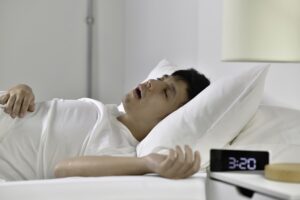
Mild cognitive impairment is the stage between normal cognitive aging and the more serious decline of dementia. This is the area where scientists believe changes can be made to help reduce the progression of dementia. Since there is no current treatment or cure for dementia, researchers are focusing efforts on developing alternative approaches to slowing the progression of the disease.
Sleep plays a vital role in the ability of the brain to stabilize and consolidate new information and memory. During the sleep cycle, the glymphatic system, or the brain’s waste management system, is also highly active. This process allows waste products, including toxins that the brain has built up during the day, to be cleaned out.
These toxins can include beta-amyloid, one of the key proteins in developing Alzheimer’s disease. This means that sleep disruption could prevent the brain from clearing these harmful toxins, leading to more accumulation of the beta-amyloid in the brain.
This important link between sleep and toxins is what has led to the investigation of whether sleep disorders could be associated with the possible heightened risk of dementia.
Mounting evidence has shown that sleep fragmentation in sleep apnea and the drops in blood oxygen at night can affect the risk of dementia. Sleep apnea is associated with a 26% increase in the development of cognitive impairment and more significant amounts of beta-amyloid in the brain.
Reduce Sleep Apnea
There are several ways to reduce the risk of sleep apnea. It often includes using a Continuous Positive Airway Pressure (CPAP) machine, which can help reduce the number of apneic episodes and improve sleep quality. Maintaining a healthy weight is also recommended for sleep apnea.
Another way to reduce the risk of sleep apnea is to avoid alcohol before bedtime. Alcohol can relax the muscles in the throat, worsening sleep apnea symptoms. Finally, sleeping on your side can help prevent sleep apnea by keeping the airway open.
Sleep Sure Plus is another excellent way to help ensure a good night’s sleep. It was designed to help promote optimal sleep and restfulness through various ingredients. One of the most important ingredients included in this unique formula is melatonin. Melatonin is a hormone that is essential for the regulation of the circadian rhythm (the internal clock of the body). Sleep Sure Plus contains valerian, one of the best natural ingredients for promoting rest and relaxation. These two essential ingredients are joined by another 6, which all work together to provide a better quality of sleep.
Healthy Brain Function
While some degree of cognitive decline is nearly inevitable as you age, this research helps to show how other factors can take a toll on the ability of the brain to function at peak potential. This can affect memory, concentration, and overall brain function.
The Smart Pill can help to enhance cognitive function and memory through 9 ingredients that help to support, nourish, and maximize brain health. These include ginkgo biloba, huperzine A, bacopa extract, rosemary extract, and a B vitamin complex. This unique formula helps boost circulation, fight free radicals, and provide nutritional support to assist with cognitive function.